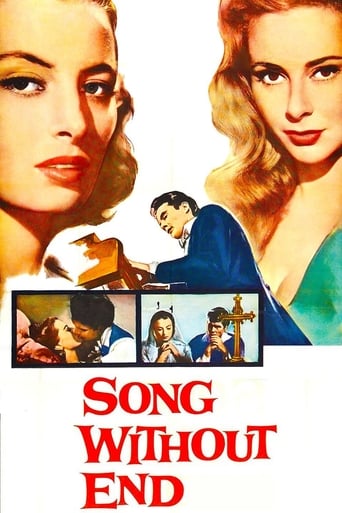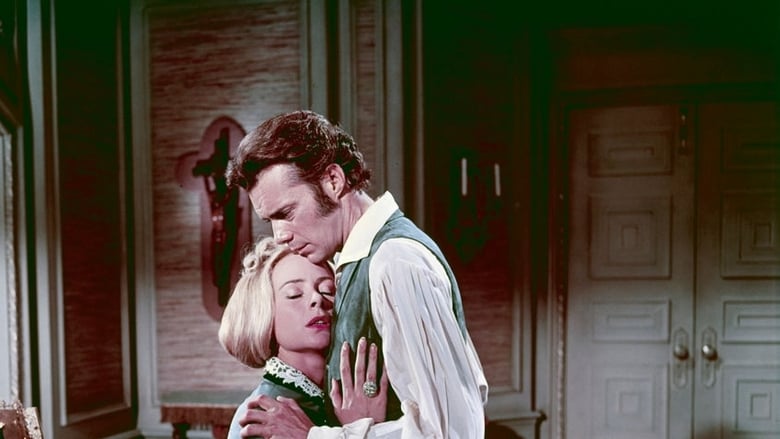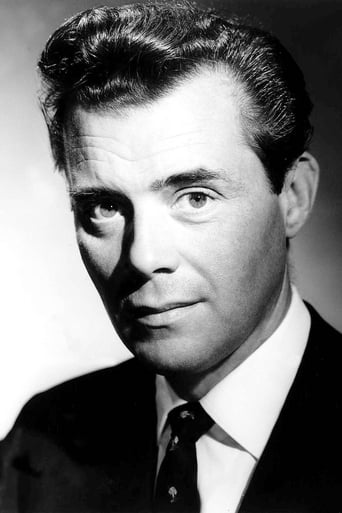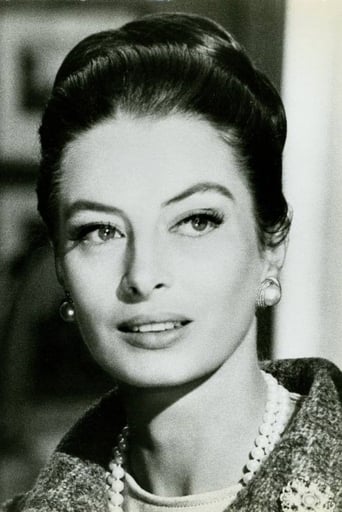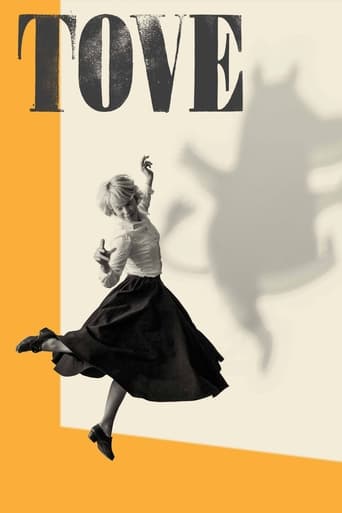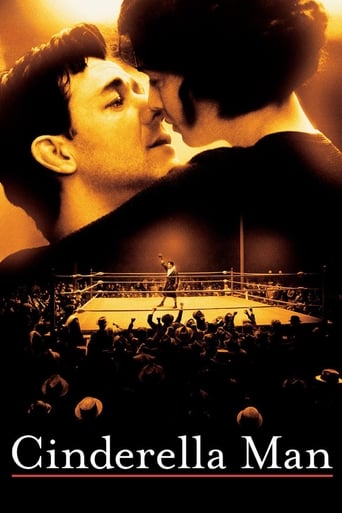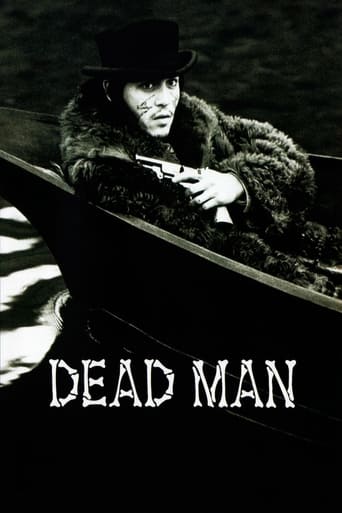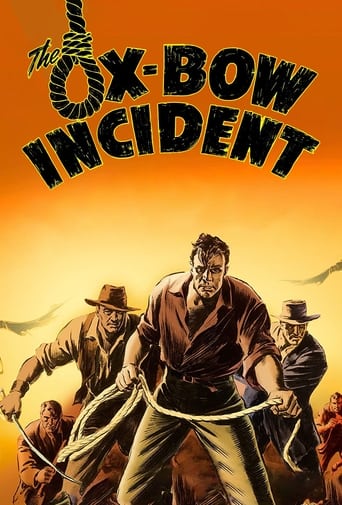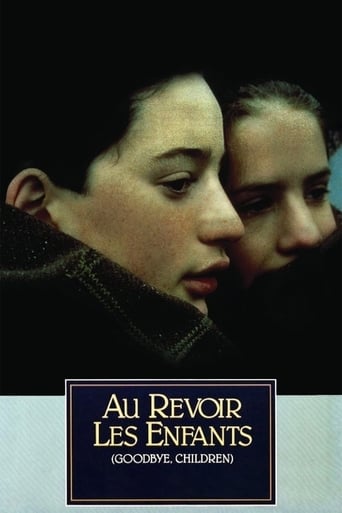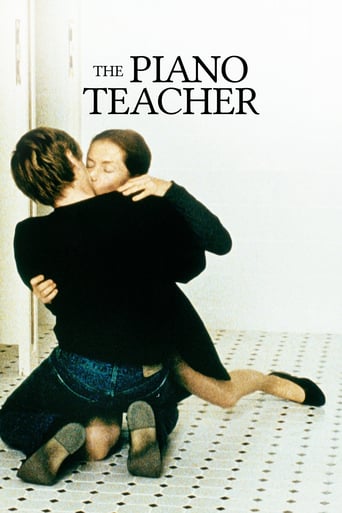Song Without End (1960)
The romantic story of Hungarian pianist Franz Liszt, whose scandalous love affair forced him to abandon his adoring audiences.
Watch Trailer
Cast


Similar titles
Reviews
This is a very beautiful film made with great meticulousness and with a serious intention to for once stick to the truth in a biopic, and the actors are all superb, especially Martita Hunt as the Grand Duchess, the most convincing one. Dirk Bogarde is excellent as Liszt but not at all as he was, more like an English gentleman than the emotionally wayward and unstable victim of his own vanity with much confusion that he was. Capucine is spellbindingly beautiful as Carolyne carrying herself with great style, and Geneviève Page makes a very convincing Marie d'Agoult. But what about the others? George Sand makes a very brief appearance, Lola Montez is not allowed at all, and there were others. Instead of telling the truth the film devotes itself to the Liszt myths and embellishes them thoroughly, so that Franz Liszt would have liked it. Of course, this at least is preferred to the terrible character assassination "Lisztomania" by Ken Russell 1975 dragging it all down to vulgarity. At least, Liszt was never vulgar. On the contrary, he was very careful about excluding himself only to the highest circles of nobility, which the film conveys adequately. Still, it's not a great film, seconded by both the great Chopin films, like Liszt never came close to the genius of Chopin. The relationship with the Princess Carolyne is greatly romanticized, and Franz Liszt confessed himself that Marie d'Agoult was his only true love. Like Liszt himself, the film is gradually bogged down into his sanctimonious catholic penchant for superstition, he neglects his own life, music and love to follow the church and thus made a fool of himself instead of fulfilling his glorious career. Well, well. The film remains a most beautiful musical illustration to his life and enjoyable as such, while it leaves you deploring his bathos. The last third of his life (he became 75) was wasted getting mummified in the church with very few more compositions.
Given the fact that this biopic is about one of the great classical composers, it's rather perplexing that so much of the music is by others. Even with those by Liszt, there are many of his transcriptions rather than original compositions.I was expecting a comprehensive presentation of Liszt in a film devoted to his life and creative work. Less of interest were works by Bach, Beethoven, Mozart and others. The results looks like the film makers may have lacked complete confidence that a movie featuring compositions exclusively by Liszt would be that attractive to viewers.In the event that's the case, it's no wonder the critical and public rating of this film is less than excellent. What's notable about it is the exquisite piano performance of Jorge Bolet on the soundtrack, the rich cinematography of James Wong Howe, and the flavorful performances by a talented cast headed by Dirk Bogarde.
"Song Without End" has a low score here on IMDb. I'm not sure why. It is superior, in my opinion, in every way to "A Song to Remember" which is a nearly totally fictionalized story of Chopin. "Song without End" has the basic facts right, not to mention 40 absolutely gorgeous musical interludes. Jorge Bolet, who plays all of the piano pieces, captures the technical pyrotechnics, the richness of tone, and the passion for which Liszt was known as a performer.The film only covers part of Liszt's life and concentrates (naturally) on the turmoil in his love affairs, which leads to his attempt to marry the already married Princess Carolyne Wittgenstein; he left his married girlfriend, Countess Marie D'Agoult, the mother of his children for her. (One of his daughters, Cosima, married Richard Wagner, who features in this film.) I disagree with a previous comment complaining about the way Liszt is portrayed. While it's not emphasized, it is obvious that he was a man of great charity, donating many of his fees to various organizations, and playing many benefit concerts. Later on, he concentrated on composing, at which he was very successful. As a performer, Liszt was a bona fide rock star in his day, complete with hysterical fans. He was most certainly attractive to women and religiously conflicted.Dirk Bogarde does a sensational job as Liszt. This and "The Angel Wore Red" were his only Hollywood films. Even if they had been successful, it's doubtful Bogarde would have stayed in the states, as he probably wouldn't have been cast in the kinds of films he wanted to make and/or the kinds of parts he wanted to play. He makes a very romantic, intense Liszt, and his fingerings are nothing short of amazing. Capucine is good, if a little wooden, as Carolyne. The supporting cast is very good.The production and costumes are opulent, but they are dwarfed by the music. Definitely some of the most brilliantly performed classical music in film.Highly recommended for classical music lovers.
In a confused welter of artistic licence, this is the classical music biopic which makes 'Song to Remember'look like a masterpiece. Bogarde succeeds in diminishing the reputation of the musical colossus who spanned European music for most of the 19th Century. The absurdities of the plot, the sequoia-like quality of the acting and the prevalence of historical,musical and linguistic anachronisms combine to elevate this offering to the status of an A1 turkey.How a pianist of the stature of Bolet came to be mixed up in this fiasco can only be guessed at. The characterisation of Liszt fails to convey even a minute impression of his magnetic personality and the overwhelming effect that he had on not only his audiences, but also his pianistic rivals.Clara Schumann herself said that 'we toil over that which Liszt reads at sight!' Whilst the emphasis seems to focus on his romantic prowess,rather than his status as the greatest pianist of the century or,arguably, of all time, one feels,nevertheless, that this was an opportunity lost.

